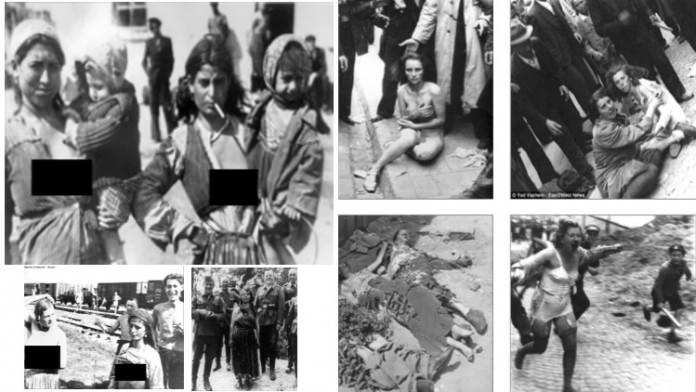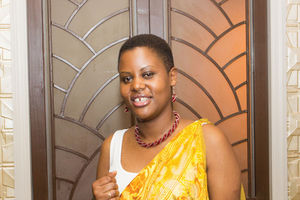
Women are often victims of sexualized atrocities during genocides. (Photos via Holocaust Memorial & Tolerance Center of Nassau County)
Consolee Nishimwe knows how important it is to speak out.
Nishimwe was only 14 years old when on April 6, 1994 Rwanda exploded into a state of chaos. That day also marked the beginning of the 100-day Rwandan genocide, which claimed upwards of 800,000 lives.
Her family did what most would do when hate-filled perpetrators seized upon the instability enveloping the nation: They fled.
Along with her mother and father, both elementary school teachers, three brothers and her sister, they hopped from place to place, desperately hiding from murderers targeting the Tutsi minority. Even neighbors couldn’t be trusted. Each moment was excruciating, and there was almost a feeling of inevitably that they’d be discovered. They resigned themselves to a heartbreaking realization that no matter where they fled to, or what they did, their time together was fleeting.
“We were waiting to be killed,” Nishimwe, who now lives in the Bronx, tells the Press.
Hoping to keep her family alive, Nishimwe’s father decided it best they separate, as to prevent the entire family from being discovered if the Hutus caught up.
They reached her father first. He was killed on April 15, just nine days after genocide broke out. Her three brothers also met the same fate.
The three remaining Nishimwes kept running.
Shortly after half her family were slaughtered, however, Nishimwe and her mother and sister were captured. Nishimwe was brutally raped, yet she survived—a “miracle,” she says.
At the outset of the devastation, Rwanda boasted a population of 7 million people—14 percent of whom were Tutsi. The genocide claimed 800,000 lives. While it’s difficult to ascertain how many women were subjected to torture and rape, the widespread nature of sexual atrocities can be measured to some degree by the number of children born from rape: an estimated 20,000. Not only were many of these women faced with the burden of caring for a child alone, but they bore other scars, physical and psychological, that festered for years. Some women like Nishimwe decided to speak out. Still, some survivors fear reliving their own sexualized atrocities—what many experts deem to be a weapon of war used during genocides that’s not to be overlooked as just a matter of circumstance.
“Rape is used as a weapon of genocide, war, and other types of conflicts in many parts of the world,” Nishimwe wrote in a post on Medium last year. “It often goes unreported during the ensuing chaos, as the more visible occurrences take most of the media spotlight. Apart from their suffering resulting from the destruction, displacement and other physical effects of the conflict, victims of this ‘silent’ atrocity are left to bear their psychological pain and trauma alone.”
Nishimwe and a panel of experts will spread that message this Sunday during a symposium at Nassau Community College titled “Women, Not Victims: Moving Beyond Sexualized Atrocities During Genocide,” presented by Holocaust Memorial & Tolerance Center of Nassau County.
The event will document how rape and other sexual crimes have historically been used to dehumanize vulnerable populations, from the Holocaust—and likely for centuries before that—to the current day civil war in Syria.

Speakers will discuss the trauma caused by rape during genocides across the globe, not just in Nazi Germany or Rwanda.
“We are presetting an issue that is generally neglected in Holocaust and genocide studies, and it’s only been in the past two years or so that this topic on sexualized violence has started to get the attention of mainstream media,” says Beth Lilach, Senior Director of Education and Community Affairs at theHolocaust Memorial & Tolerance Center of Nassau County.
Discussions about genocides are often followed by the shocking number of people killed as a result, and rightly so. But advocates say rape is oftentimes misunderstood as an outgrowth of atrocities, and not a weapon used to brutalize thousands of people.
Lilach says one of the conference’s many goals is to “shatter myths” about rape, so that people understand that rape is part and parcel of genocide.
“It’s a weapon that’s not acknowledged,” Lilach tells the Press.
Sexualized weaponry is deployed in a number of ways, Lilach says. Several Nazi concentration camps were outfitted with so-called “brothels”—actually, they were “rape barracks”—where non-Jewish male prisoners were brought to reclaim a sense of “normalcy”—by raping female prisoners. Guards also assaulted enslaved women.
“What is so stunningly, strikingly missing [from history] is the female perspective,” Lilach says.
Besides individual survivors speaking out, international bodies are also battling the scourge of genocidal rape through the courts.
For seven years, Najwa Nabti worked as a prosecutor for the United Nations International Tribunal (ICTY) for the former Yugoslavia at The Hague in the Netherlands.
Established in 1993, the ICTY is charged with investigating war crimes that arose out of the conflicts in the Balkans in the 1990s.
Nabti, who currently serves as director of the Undergraduate Law and Master of Legal Studies Program at the University of Arizona, said the ICTY and the International Criminal Tribunal for Rwanda were among the first judicial bodies created to seek justice for victims of wars or genocide.
During her keynote address on Sunday, Nabti plans to discuss how the testimony of survivors of sexual violence has shaped international law.
Nabti says evidence provided by survivors has been crucial in understanding the prence of sexual crimes. As a result, she tells the Press, “we can legally view sexual violence as persecution, as torture, as genocide, and not just rape—that it really does form part of the broader campaign during armed conflict.”
“The more we can include these cases in our efforts establishing accountability…the more it should really deter these acts, but possibly even more importantly, help us understand how to avoid allowing these situations to happen where its likely to be prent,” Nabti explains.
While it’s important not to understate the importance of international tribunals in handing out justice, the legacy of these courts may be reflected in how nationalized courts have used international concepts to prosecute perpetrators.
“You have survivors willing to come forward, even in these domestic cases where it might be even more difficult because they’re so close to the conflict and the perpetrators,” Nabti says. “And it’s difficult to perceive how all of that could have happened on the scale that it’s now…without those kind of groundbreaking steps that these initial survivors were willing to make.”
Of course, it’s not easy for survivors to express the constant pain—and sometimes shame—as a result of being raped.
Nishimwe didn’t find her voice until she moved to the United States in December 2001.
She lived in Queens for a period, then Elmont, and now resides in the Bronx.
It was only when she came to America that she started writing about her experience in a journal—which she parlayed into a book: Tested to the Limit: A Genocide Survivor’s Story of Pain, Resilience, and Hope.
Once here, Nishimwe began receiving therapy, discovering that talking about the atrocities she faced was cathartic. But her horrific ordeal did not just end when the mass rapes and murders ceased. While Nishimwe found her voice, she also discovered that she was HIV-positive, as a result of the rape.
She now devotes herself to helping other survivors—many of whom have sent her heartwarming letters thanking her for being an inspiration.
“I want to make sure that I become a voice for others,” she says.
“It has not been very easy for me to talk about, of course…it took me a long time to talk about my experience, but I realize that for me, having the courage to talk about it is so important…so I have to be a voice for those who cannot speak for themselves.”
Originally published HERE.








